上海牛津版英语六年级上册六上6A重点词汇复习及练习同步讲义教案
上海牛津版英语六年级上册六上6A期中复习Unit1-Unit5U1-U5同步讲义教案

上海牛津版英语六年级上册六上6A期中复习Unit1-Unit5U1-U5同步讲义教案学员编号:年级:六年级课时数:学员姓名:XXX辅导科目:英语学科教师:XX授课类型星级教学目标T Unit1-5(牛津6上)基础知识复1、使学生能够掌握牛津6年级上册Unit1-5中的基础词汇及重要句型;2、使学生能够掌握针对该5个单元的练中的考察点。
T同步U1-U5基础知识梳理建议2-5分钟)我们本次课的主要内容是复Unit1-5的重要知识点,你呢有5关要通过,挑战一下Round 1自己,看是否可以全部通关Youhave5-6minutesto↖(^ω^)↗XXXlanguage points and then beXXX.批注:因为本次课要复梳理5个单元的语言点,需要学生掌握的东西较多,所以学生们很容易中途疲惫,建议老师可以用类似游戏通关的方法(内容如上方图形中提到的Round1)让学生对复内容不那么乏味。
并可适当准备点糖果饮料作为通关奖励。
建议20-25分钟)1Unit11.relativen.亲戚2.XXX.孙子,外孙great-XXX曾(外)孙3.onlyadv.仅仅4.XXX.成员,会员5.classmaten.同班同学6.XXX.羽毛球7.cyclev.骑自行车8.family tree家谱9.birthday card华诞贺卡10.watch TV/ a film看电视/片子11.a blank piece of paper一张白纸12.a photo of一张照片批注:本单元的名词较多,涉及到的单词固定用法不是太多,但多是日常生活高频用语。
对于相对零散的单词,学生不太容易复,可以尝试将单词编进一小段情景故事,方便学生平时回顾。
如:我在a blank piece of paper上画了一幅familytree,上面有所有的familymembers,画好后我把它拍了下来(aphotooffamilytree)准备周一拿给我的classmates看。
上海牛津版英语六年级上册六上6AUnit5U5同步讲义教案
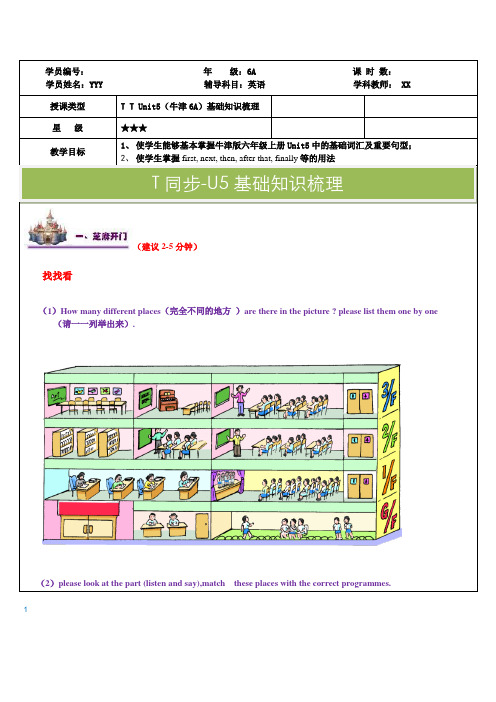
学员编号:年级:6A 课时数:学员姓名:YYY 辅导科目:英语学科教师: XX 授课类型T T Unit5(牛津6A)基础知识梳理星级★★★教学目标1、使学生能够基本掌握牛津版六年级上册Unit5中的基础词汇及重要句型;2、使学生掌握first, next, then, after that, finally等的用法(建议2-5分钟)找找看(1)How many different places(完全不同的地方)are there in the picture ? please list them one by one (请一一列举出来).(2)please look at the part (listen and say),match these places with the correct programmes.T同步-U5基础知识梳理1Places ProgrammeArts and crafts room meet the teacherMusic room visit classroomClassroom look at noticeboardLibrary listen to choirHall parents arriveEntrance look at projects批注:这两个小游戏既结合了课本有关的内容,有可以很好的抓住孩子的兴趣。
(建议20-25分钟)一、词汇Words1.programme n 活动安排Eg:What is your programme for tomorrow?2. notice board n 布告栏Eg:The latest news is put on the noticeboard.批注:教师应该拓展一下notice的用法。
(1)notice作名词,意为"通知,预告,警告",是不可数名词。
如:The hotel is closed until further notice. 宾馆现已停业,开业时间另行通知。
上海牛津版英语六年级上册六上6AUnit6U6同步讲义教案

学员编号:年级:课时数:学员姓名:辅导科目:英语学科教师:授课类型TUnit6 (牛津6上)基础知识梳理教学目标1、使学生能够基本掌握牛津6年级上册Unit6中的基础词汇及重要句型;2、使学生掌握的基本用法和解题技巧;星级★★★★授课日期及时段T同步-U6基础知识梳理批注:上面图片代表怎样的乘车方式呢,每种方式都需要花费多长时间呢?还有其他的什么样的乘车方式呢?让我们头脑风暴吧!二,奇童哥具---------------- (建议20-25 分钟)想要怎么乘车出游呢,揭开我们的‘美人面纱’吗?让我们先扫开单词障碍吧!Ready, go!! |1. travel v. / n. 行走,旅行e. g. The girl is traveling in the Europe. 那个女孩欧洲旅行。
I want another travel to Beijing . 我想再次出游北京。
批注:先让学生回顾都有哪些表示旅行的词语,然后在对这些词语进行详细的区别【知识拓展】traveler n.游者,游客 go travelling 去旅游2 2. ferry n. (1)渡船 (2)渡口 v.(用船或飞机等)运送(货物)(通常指短程的或定期的)e.g. I like to go to work by ferry.我喜欢乘船上班。
批注:先让学生回顾各种交通方式,进而引导出各种交通方式的表达方法【知识拓展】by ferry 乘船 中 3. advertisement n.广告e. g. There are many advertisements around us .我们周围有很多的广告。
5. few a.几乎没有,修饰可数名词复数 【知识拓展】a few 一些,用于修饰可数名词复数e.g. There few apples in the basket .篮子里几乎没有苹果。
批注:由few 引导出a few ,然后对其进行区别,最后再跟容易混在一起考试的 进行记忆 、重要句型 Important Sentences structures1. He goes to school by bus. 他乘公共汽车去上学。
牛津沪教版六年级上6AUnit1-Unit2重要知识点复习
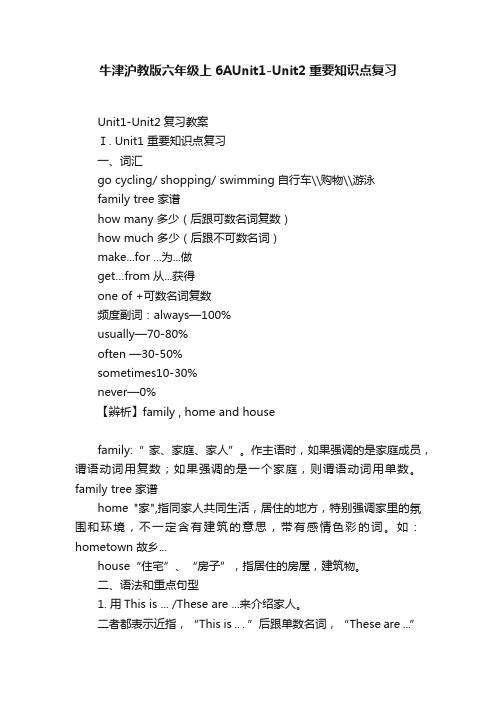
牛津沪教版六年级上6AUnit1-Unit2重要知识点复习Unit1-Unit2复习教案Ⅰ. Unit1 重要知识点复习一、词汇go cycling/ shopping/ swimming自行车\\购物\\游泳family tree 家谱how many 多少(后跟可数名词复数)how much 多少(后跟不可数名词)make...for ...为...做get…from从...获得one of +可数名词复数频度副词:always—100%usually—70-80%often —30-50%sometimes10-30%never—0%【辨析】family , home and housefamily:“ 家、家庭、家人”。
作主语时,如果强调的是家庭成员,谓语动词用复数;如果强调的是一个家庭,则谓语动词用单数。
family tree 家谱home "家",指同家人共同生活,居住的地方,特别强调家里的氛围和环境,不一定含有建筑的意思,带有感情色彩的词。
如:hometown 故乡...house“住宅”、“房子”,指居住的房屋,建筑物。
二、语法和重点句型1. 用This is ... /These are ...来介绍家人。
二者都表示近指,“This is .. . ”后跟单数名词,“These are ...”后跟复数名词或者多个不同的对象。
2.用how many 来询问数量后接可数名词的复数形式,当我们提问你有多少……时候,如果How many后跟人,常用how many... do you have?如果How many 后跟物,常用how many...have you got?3.What do you do with your... ? 和What else do you do with your... ? 来提问与家庭成员或亲戚一起做什么.else 意为别的其他的,常用于特殊疑问词或不定式之后,如what else, something else等。
牛津沪教版六年级上6AUnit1-Unit2 重要知识点复习
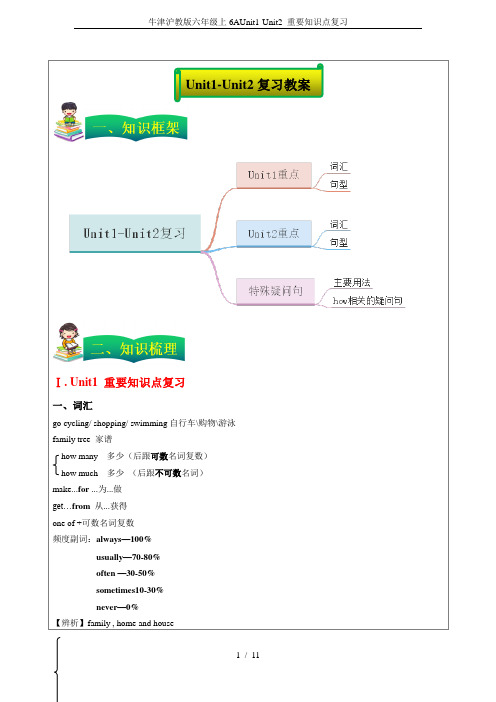
Unit1-Unit2复习教案Ⅰ. Unit1 重要知识点复习一、词汇go cycling/ shopping/ swimming自行车\购物\游泳family tree 家谱how many 多少(后跟可数名词复数)how much 多少(后跟不可数名词)make...for ...为...做get…from从...获得one of +可数名词复数频度副词:always—100%usually—70-80%often —30-50%sometimes10-30%never—0%【辨析】family , home and housefamily:“ 家、家庭、家人”。
作主语时,如果强调的是家庭成员,谓语动词用复数;如果强调的是一个家庭,则谓语动词用单数。
family tree 家谱home "家",指同家人共同生活,居住的地方,特别强调家里的氛围和环境,不一定含有建筑的意思,带有感情色彩的词。
如:hometown 故乡...house“住宅”、“房子”,指居住的房屋,建筑物。
二、语法和重点句型1. 用This is ... /These are ...来介绍家人。
二者都表示近指,“This is .. . ”后跟单数名词,“These are ...” 后跟复数名词或者多个不同的对象。
2.用how many 来询问数量后接可数名词的复数形式,当我们提问你有多少……时候,如果How many后跟人,常用how many... do you have?如果How many 后跟物,常用how many...have you got?3.What do you do with your... ? 和What else do you do with your... ? 来提问与家庭成员或亲戚一起做什么.else 意为别的其他的,常用于特殊疑问词或不定式之后,如what else, something else等。
上海牛津版英语六年级上册六上6A期末复习Unit6-Unit10U6-U10同步讲义教案
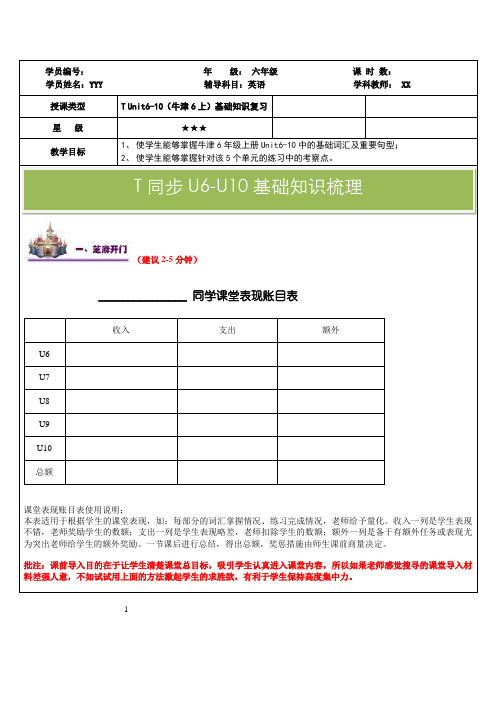
学员编号:年级:六年级课时数:学员姓名:YYY 辅导科目:英语学科教师: XX 授课类型T Unit6-10(牛津6上)基础知识复习星级★★★教学目标1、使学生能够掌握牛津6年级上册Unit6-10中的基础词汇及重要句型;2、使学生能够掌握针对该5个单元的练习中的考察点。
(建议2-5分钟)_______________ 同学课堂表现账目表收入支出额外U6U7U8U9U10总额课堂表现账目表使用说明:本表适用于根据学生的课堂表现,如:每部分的词汇掌握情况、练习完成情况,老师给予量化。
收入一列是学生表现不错,老师奖励学生的数额;支出一列是学生表现略差,老师扣除学生的数额;额外一列是备于有额外任务或表现尤为突出老师给学生的额外奖励。
一节课后进行总结,得出总额,奖惩措施由师生课前商量决定。
批注:课前导入目的在于让学生清楚课堂总目标,吸引学生认真进入课堂内容,所以如果老师感觉搜寻的课堂导入材料差强人意,不如试试用上面的方法激起学生的求胜欲,有利于学生保持高度集中力。
T同步U6-U10基础知识梳理1(建议20-25分钟)一、词汇WordsUnit61. travel v.行走,旅行2. minute n. 分钟3. ferry n. 渡船4. hour n. 小时5. advertisement n. 广告6. board n. 栏,板7. temple n. 庙宇8. light rail 轻轨9. department store 百货商店10. housing estate 居民区11. far away from离……远12. by bus /ferry/ underground乘公共汽车/渡船/地铁13. go to school 去上学14. travelling time 行走时间15. get to the supermarket 到达超市16. a few 几个17. a lot of 许多18. on the bus在公共汽车上批注:1. 复习本单元词汇时,建议老师可以分类让学生看,如:跟交通工具有关的,跟时间有关的,跟生活小区有关的等,方便学生回忆。
unit 6 同步教案 2023-2024学年牛津上海版六年级上学期英语
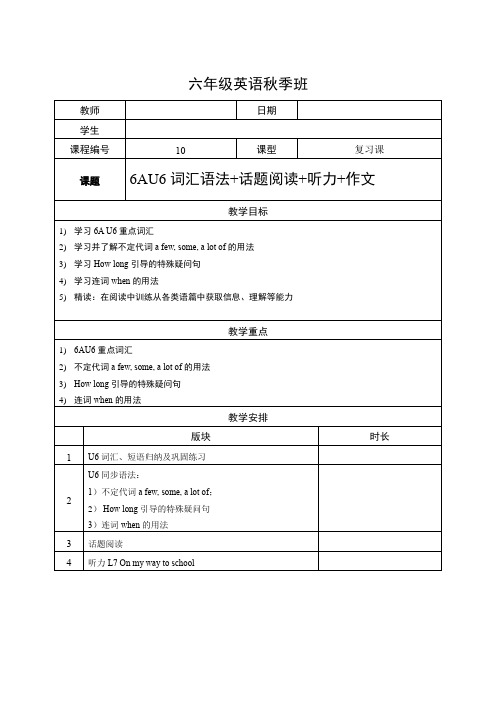
六年级英语秋季班1. 6A U6同步与提高Part 1词汇语法复习(1)根据对应的音标和词性,写出单词的中英文6A U6 Vocabulary (牛津)序号英文音标词性中文1/ˈtrævl/v.2/əˈbaʊt/adv.3/'mɪnɪt/n.4[ˈferi]n.5[ˈaʊə(r)]n.6[həʊˈtel]n.7[ədˈvɜ:tɪsmənt]n.8[bɔ:d]n.9[wen]conj.10[lait reil]n.11[diˈpɑ:tmənt stɔ:]n.12[ˈkɪndəgɑ:tn]n.13[ˈhauziŋ isˈteit]n.14[ˈtempl]n.15[hɑ:f æn ˈauə]16[ə fju:]17[ə lɔt ɔv](2)6A U6语法重难点1. be/live near some place 离/住得离某地近My school is _______ my home. 我家离学校很近。
I live _______ my school. 我住得离学校很近。
2. be/live far (away) from some place 离/住得离某地远The hospital is ________ ________ the supermarket. 这家医院离超市很远。
She lives ________ ________ the hospital. 她住得离医院很远。
3. go to some place by + n. 乘某种交通工具去某地= go to sp. in/on a/an/the + n.= take a/an/the + n. to sp.I usually go to the park by car. 我通常坐车去公园。
= I usually go to the park in a car.= I usually take a car to the park.She sometimes goes to work by bus. 她有时乘公交车去上班。
上海沪教版牛津英语6A六年级上册全册教案
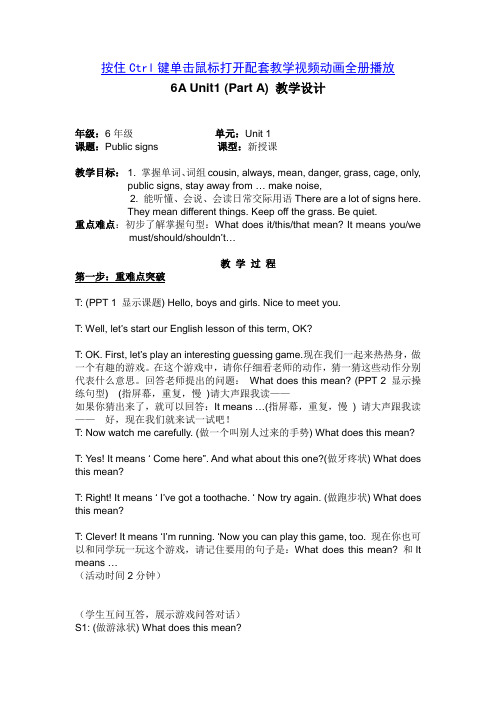
按住Ctrl键单击鼠标打开配套教学视频动画全册播放6A Unit1 (Part A) 教学设计年级:6年级单元:Unit 1课题:Public signs 课型:新授课教学目标: 1. 掌握单词、词组cousin, always, mean, danger, grass, cage, only, public signs, stay away from … make noise,2. 能听懂、会说、会读日常交际用语There are a lot of signs here.They mean different things. Keep off the grass. Be quiet.重点难点:初步了解掌握句型:What does it/this/that mean? It means you/we must/should/shouldn’t…教学过程第一步:重难点突破T: (PPT 1 显示课题) Hello, boys and girls. Nice to meet you.T: Well, let’s start our English lesson of this term, OK?T: OK. First, let’s play an interesting guessing game.现在我们一起来热热身,做一个有趣的游戏。
在这个游戏中,请你仔细看老师的动作,猜一猜这些动作分别代表什么意思。
回答老师提出的问题:What does this mean? (PPT 2 显示操练句型) (指屏幕,重复,慢)请大声跟我读——如果你猜出来了,就可以回答:It means …(指屏幕,重复,慢) 请大声跟我读——好,现在我们就来试一试吧!T: Now watch me carefully. (做一个叫别人过来的手势) What does this mean?T: Yes! It means ‘ Come here”. And what about this one?(做牙疼状) What does this mean?T: Right! It means ‘ I’ve got a toothache. ‘ Now try again. (做跑步状) What does this mean?T: Clever! It means ‘I’m running. ‘Now you can play this game, too. 现在你也可以和同学玩一玩这个游戏,请记住要用的句子是:What does this mean? 和It means …(活动时间2分钟)(学生互问互答,展示游戏问答对话)S1: (做游泳状) What does this mean?S2: It means ’swim ”.S1: (做快速游泳状) What does this mean?S2: It means ’swim fast ”.S3: (做停止手势) What does this mean?S4: It means ’Stop ”.S4: (竖起大拇指) What does this mean?S3: It means ’Great ”.T: They did a good job. What about you? 你呢?(本步骤设计说明:本节课课文对话生词较多,对话中反复出现新句型What does it mean? It means … 学生感觉比较陌生,在理解时会产生困难。
上海牛津版英语六年级上册六上6AUnit8U8同步讲义教案

学员编号:年级:课时数:学员姓名:辅导科目:英语学科教师:授课类型TUnit8(牛津6上)基础知识梳理教学目标1、使学生能够基本掌握牛津6年级上册Unit8中的基础词汇及重要句型;2、使学生掌握的基本用法和解题技巧;星级★★★★授课日期及时段T同步-U1基础知识梳理(建议2-5分钟)批注:想吃cakes ? rice? Noodles ? 哪样事物是你喜欢的呢?还有还有其他的呢,这样引导学生说出自己喜欢的事物,进而引导进入今天的课程主要内容。
(建议20-25分钟)想要表达我们喜欢的事物吗?让我们先扫开单词障碍,打开我们的菜单吧!一、词汇Words1.also adv. 也;还;同样(放在句中)e. g. You are 11 years . I am also the same age. 你11岁,我也是同岁。
批注:表示“也”的词语很多,然后可以先引导学生尽量的回忆学习过的同样意思的词语,然后在分别进行各词汇间的区别及使用【知识拓展】too 也,放在肯定句的句尾,逗号隔开; either 也,放在否定句句尾,并用都好隔开2. kind n. 种类a.和蔼的宽容的e. g. There are many kinds of fruit in the fruit shop .水果商店里有很多种类的水果。
Our English teacher is very kind. 我么你的英语老师很和蔼。
【知识拓展】all kinds of……各种种类,a kind of …一种……批注:先让学生回顾本单词的意思,然后在给出all kinds of / a kind of 短语的形式,然后让学生猜测短语的意思,最后在给出短语的意思3. fry v. 油炸;油煎;油炒e. g. They like to fry something to eat . 他们都喜欢炸东西吃。
【知识拓展】fried a. 油炸的e.g. Children like fried food nowdays. 现在孩子都喜欢油炸食物。
上海牛津版英语六年级上册六上6AUnit1U1同步讲义教案
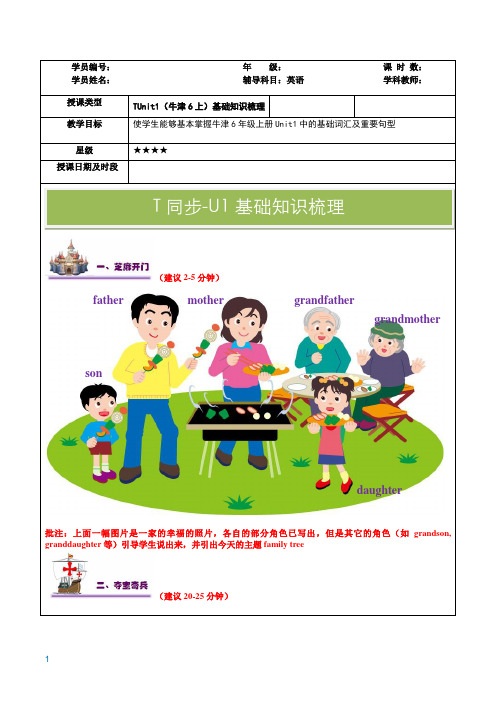
学员编号:年级:课时数:学员姓名:辅导科目:英语学科教师:授课类型TUnit1(牛津6上)基础知识梳理教学目标使学生能够基本掌握牛津6年级上册Unit1中的基础词汇及重要句型星级★★★★授课日期及时段T同步-U1基础知识梳理(建议2-5分钟)father mother grandfathergrandmother sondaughter批注:上面一幅图片是一家的幸福的照片,各自的部分角色已写出,但是其它的角色(如grandson, granddaughter等)引导学生说出来,并引出今天的主题family tree(建议20-25分钟)一、词汇与词组Words and words phrases1. 本单元中出现的主要家庭成员的称谓包括:1)表示和自己有直系血缘关系的:Father(父亲,爸爸)mother ( 母亲,妈妈) sister (姐姐,妹妹) brother (哥哥,弟弟)等以上称谓对于我来说都是家人,即my family members2) 表示和自己有或无血缘关系得:Grandfather(祖父,外祖父) grandmother(祖母,外祖母),grandson(孙子,外孙)granddaughter (孙女外孙女),uncle(叔叔,舅舅),aunt(姨父,姑父阿姨,姑妈,婶婶),cousin(堂表兄,堂表第,堂表姐堂表妹)2. play games 玩游戏;play footbal踢足球;play badminton(打羽毛球)【知识拓展】play 后跟球类运动时不加定冠词,但跟乐器时,乐器名称前要加定冠词theLet's play badminton together after school! 让我们放学后一起打羽毛球吧I usually play football with my father on Saturday. 周六我常和父亲一起踢足球I can play the piano. 我会弹钢琴Listen! Someone is playing the violin. 听有人在拉小提琴批注:play用法之前有学习过,所以这部分主要以学生为主导,教师引导讲解2) 3.go后面常跟动词的doing形式,表示去做某件事情【知识拓展】go shopping(去购物);go swimming(去游泳) ;go cycling(去骑车)go travelling(去旅游); go fishing (去钓鱼) go skating 去溜冰;go skiing 去滑雪My grandfather sometimes goes fishing on a warm afternoon. 在暖和的下午,我爷爷It's a fine day. Let's go cycling! 多好的天气呀" 让我们一起去骑车吧批注:知识拓展部分可由教师提问的方式由学生来回答4. go to a restaurant 去饭馆吃饭;go to the park去公园注意这几个固定搭配中的名词前要加适当的冠词,比如:go to the cinema去看电影go to the supermarket 去超市等My family usually go to the restaurant at the weekend. 周末我们家常去饭馆吃饭Mum, can I go to the supermarket with you? 妈妈,我能和你一起去超市吗?5. watch TV去看电视;watch a film(看电影) 此处,watch意思为观看,又如" watch 看卡通,动画片; watch carefully(仔细观察)I like watching cartoons very much. 我非常喜欢看卡通片The science teacher usually asks us to watch him carefully.科学老师常让我们仔细观察批注:这部分可以给学生进行4个看的用法回顾(see, look, read, watch)6.本单元出现了三个频度副词:always 总是,一直usually 经常,常常sometimes有时We should always help each other. 我们始终应互相帮助My father usually goes out for a walk after dinner.晚饭后我父亲经常出去散步She sometimes watches TV after homework. 做完作业后她有时候会看电视批注:还可以给学生巩固其它频度副词,并复习对频度副词用how often用法二、重要句型Important Sentences structures1. This is ... /These are ...来介绍家人。
word完整版牛津沪教版英语六年级上重点知识复习及练习

牛津沪教版英语六年级上重点知识复习及练习六年级上重点知识复习及练习Part 1单词梳1spendv.度拓spend v.花b spend some time / some money (in) doing sthsb spend some time / some money on sthEg: Lucy spends five hours in doing her homework..注spend-spent-spent. cost花sth cost sb some money.某物花费了某人多少take花It takes sb some time to do sth做某事花了某人多久时2islandn.岛住在某岛live on.Eg: He lives on Chong Ming Island.3bayn.海近义harbour海4weekendn.周短语at weekends在周5seasiden.海拓side n.6luckyadj.幸运的,好运luckilyadv.反义unlucky; unluckily7.marketn.市supermarket超8. activityn.活activities(复active adj.活跃barbecuen.烧10.sandcastlen.沙11. collectv收collectionn.收集物(可数12. plan v.计短语plan to do sth.计划做某Eg: I plan to buy a new bag.13. shallmodal v.将要,好吗(主要对第一人称复数提问Eg: Shall we go out and play together?过去should14. cost花短语sth cost sb some money.某物花费了某人多少Eg: The book costs me ten dollars.15. trip n.旅短语a trip/ visit to some plac去某地旅8/ 1牛津沪教版英语六年级上重点知识复习及练习Part 2 短语整理一起在外度过一天 1. spend a day out together在绿岛2. on Green Island在快乐3. in Happy Town在龙4. in Dragon Bay在幸运岛5. on Lucky Island在周6. at weekends = at the weekend离开某地近7. be near sp.离开某地远8. be far (away) from sp海边9. Seaside Town一张我家人和我的照10. a photo of my family and me一起吃午11. have lunch together格林市12. Green Market在太阳13. In Sunny Town太空博物14. Space Museum在月亮15. In Moon Town一项活16. an activity进行一次烧17. have a barbecue放风18. fly kites骑自行19. ride bicycles筑沙20. make sandcastles收集贝21. collect shells制作一本照片22. make an album计划做某23. plan to do sth.一个好主24. a good idea哪一个地25. which place计划一次旅26. plan a trip……怎么样?(常用于表示建议或提议27. How abou打算做28. be going to + v.Part 3基础练一单项选-ups _________ this .( ) 1 . Let's do some pusD . withB . forC . like A . at) 2 . Boys are interested __________ ball games .(D . in playC . to played A . in playing B . at play) 3 . This room is ____________ .(D . Alice and Betty'C . Mary's and Joan' A . Tom's and Mik B . Alice and Lucy ) 4 . Why not __________ for a walk ?(D . goingB . go C . went A . to go) 5 . How _________ the little girl walks !(D . more quicklyC . quicker A . quick B . quickly) 6 . We hope _________ the game .(D . to winningB . wonC . to win A . winning) 7 . The accident happened _________ a cold winter evening .(D . inC . on B . at A . from8/ 2牛津沪教版英语六年级上重点知识复习及练习) 8 . Let's read the text , _____________ ?(D . do you C. will you A . do we B . shall we”in English ?( ) 9 . How can you ________ “在晚D . talkC . say A . speak B . tell ) 10 . Sports can keep us __________ .(D . healthyC . unhealthy A . health B . healthily用所给单词的适当形式填1. What would you like _________ (have) for your dinner tonight?2. You have enough time to do the work. You don't need _________ (finish) it nowyou a shirt for your birthday. What colour do you like bestbu3. Bill, let me _________4. Where will we go __________ (look) for the missing mobile phone?5. Tom asked me if I would go _________ (windsurf) with him.Let' s take the elevato.(four)6. Toys for Kids is on the______ floor.(shop)7. Most of the_____ _malls in Canada are near city centres,I' 11 wear the T - shirt with the long______. ( sleeve)8. It' 11 be very sunny tomorrow.(change) Can I try on the shirt in the______ room? Of course you can.9.改写句保持愿意不)1. How about taking a walk after dinner? take walk after dinner._________ __________保持愿意不)2. He wouldn't like to be a cook in the future. to be a cook in the future.He ___________ ______________)3. The book cost me 20 yuan. 划线部分提the book cost ?________ __________4. Kitty is a very friendly student. 感叹)Kitty is!________ ________)5. He is our Chinese teacher. 保持愿意不Chinese.He _________ _________改为否定)6. She helps me clean the house. clean the house.She ________ __________Part 4综合练Reading and comprehensionAThis is a question many students ask. In my opinion, the most effective way is to learnHow can I learn English well?nlessons by heart. If you can recite the text and write it out, you've learned it fairly well. And if you can tell, in your oy successful learner indeed. Your English will be quite perfect.words, what the lesson says you're a veyouThis is a difficult task. However, if you try to learn by heart only part of each lesson, you'll find it not half so hard asmight have thought.towayonouranecessary.writingisalsoIthelpsyoulotcourse,progress.makeyouthisLearningway,willrapidOf success in English.Equally important is to feel the language. You should be able to laugh at jokes and be shocked at bad news. When usingEnglish, try to forget your mother tongue. Instead of helping you, your own language gets in your way. So, never try to seeEnglish through translation.1.In the writer's opinion, the most effective way in learning English is ____A.to practise speaking, writing and feeling itB.to forget your own native languageC.to translate everything into his own languageD.to memorize the English words and grammatical rules8/ 3牛津沪教版英语六年级上重点知识复习及练习2. “Instead of helping you, your own language gets in your way.”This sentence means that memorizing your own languagecan ________.B.stop you mastering English A.help you to study English wellD.help you notice mistakesC.make English easy to learn3.Equally important is to feel the language. “to feel the language”here means________.A.to get a knowledge of English by touchingB.to be able to read and write EnglishC.to translate English into your own by imaginingD.to be able to experience the rich sensation of the languageBWhen we can see well, we do not think about our eyes often. It is only when we can not see perfectly that we come to seehow important our eyes are.People who are nearsighted can only see things that are very close to their eyes. Many people who do a lot of close work,such as writing and reading, become nearsighted. Then they have to wear glasses in order to see distant things clearly.People who are farsighted face just the opposite problem. They can see things that are far away, but they have difficultyget glasses too.reading a book unless they hold it at arm's length. If they want to do much reading, they musOther people do not see clearly because their eyes are not exactly the right shape. This, too, can be corrected by glasses.isSome people's eyes become cloudy because of cataracts. Long ago these people often became blind. Now, however, itpossible to operate on the cataracts and remove them.When night falls, colors become fainter to the eyes and finally disappear. After your eyes have grown used to the dark, youcan see better if you use the side of your eyes rather than the centers. Sometimes, after dark, you see a small thing to oneside of you, which seems to disappear if you turn your head in its direction. This is because when you turn your head, youat the thing too directly. Men on guard duty sometimes think they see something moving to one side of them.arelookinthismistaken.However,andtheybelievetheywerestraightatit,theycannotseeitanymore,Whentheytur ntolookmistake happens because the center of the eye, which is very sensitive in daylight, is not as sensitive as the sides of the eyeafter dark.4.We don't know that our eyes are of great importance until ________B. we cannot see clearlyA. we think about our eyesD. we have to do much readingC. we wear glasses5.According to the passage, a ________ is more likely to be nearsighted.D.painterC. guardA.tailorB. doctor6.People who are farsighted ________ .A.cannot do a lot of close work without glassesB.can only see things that are very close to their eyesC.have difficuly reading a book if they hold it at arm's lengtD.have the same problem as the nearsighted people7.To see a small thing at night, it is better to look ________ .B.with half shut or narrowed eyesA.with wide open eyesD.in a slightly different directionC.straight at itC Read and answer the questions.difference.noofbirthdays.庆)theirAmericanchildrenaretowordoverfromChildrenallthelikecelebrateAmerican children usually celebrate with a party. They invite their friends to join the party. The party may not be held on theexact date of birthday if it comes to a school day. It may be held on the closest weekend instead. Today two kinds of parties are the most popular. One is held at home. Parents make their house beautiful with balloonsand coloured paper. They prepare a special birthday meal. The children play games. The other one is held away from home.Some are at a special restaurant. The children eat pizza and ice cream. The waiters, who serve the food, also sing and telljokes to the children. Other parties may be held at a park, a movie theatre or some other places.8/ 4牛津沪教版英语六年级上重点知识复习及练习Every birthday party has a birthday cake with candles on it. There is one candle for each year of a birthday boy. or girl'sage. When the candles are lighted, everyone sings the special birthday song: HAPPY BIRTHDAY TO YOU.79. When will they hold their birthday party if the birthday comes to a school day?________________________________________________________80. Are there only two kinds of parties?________________________________________________________81. Are parents very busy when the party is held at home?________________________________________________________82. What do the waiters do to the children to celebrate their birthday?________________________________________________________83. Where may other parties beheld?________________________________________________________84. When you are twelve years old, how many candles do you need?________________________________________________________首字母填Dclasses. They can do things they want to do. Mary will go to the1It's Sunday today. The students have n hard.3to see a film with her friends. Tony and some other boys are going to play football. Eddiewc____2__on TV. They will b__6___to the library to read the books. John is going to watch a football m5He is g4 very happy..__________ 6. __________1. __________ 2. __________ 3. ___________ 4. ________四.练I用现在进行时改写句Tom can speak Chinese.1We have four lessons.23I watch TV everyday.She works in a hospital.4.):选择最恰当的答I. Choose the best answer Lucky Island?___________1.Where have you beenD. fromC. inA. atB. on.2.Look, this is a photo of____________D. I and youB. me and youA. you and IC. you and me__________ China. People usually go there by air.3.The USA isD. far away fromB. awayC. far awayA. farHave you ever been to Thailand?4.wice.Yes, I have. I have been _____________D. itC. thereA. to thereB. to it8/ 5牛津沪教版英语六年级上重点知识复习及练习___________ your father usually ____________ at weekends?_5. WhatD. will; do C. did; do A. do; do B. does; do. 6. Alice is a friend ofD.mineB. IC.myA. mepiano.7.Jack likes to playfootball. His sister, Mary, likes to playD./;/B. the;theC./;theA. the; /Shanghai.8.Here is a mapD. atC. forA. ofB. inin her spare time.9.My mother likesB.to go shopsA. go shoppingD. to going shoppingC. going shoppingseven o'clock.10. He arrived at the History MuseumD. onforB. inC.A. at11. We are going to visit the Bund _____________ .B. last SundayA. next SundayD. the SundayC. on SundaysHow can we get to the Space Museum?12.bus.Let's go ______________D. at aA. onB. byC. in afilm?13.I feel so bored. How about _____________D. seeingC. to seeingA. to seeB. see?14.What time will you come ____________D. backC. to homeA. thereB. to here____________ happily.15.Look, the studentsB. playA. are playingD.is playinC. played. Complete the sentences with the given words in their proper forms 用所给单词的适当形式完成句)of my family and me. (photo)1. These are somecenters in Shanghai. (shop)2. There are a lot of_______________ . (birth)3. Tomorrow will be my tenth4. This is a photo of Ben and_______________ father. (he)here. (friendly)5. He got some new______________True or False. 阅读短文,判断正It's Sunday today. It's five o'clock in the afternoon. Dick is going to the supermarket with his parents. His father is nowcleaning the car. He is going to drive his family to the supermarket. It is far away from their home. His mother is going tbuy a lot of food: bread, milk, fruit and drinks. She also wants to buy many other things for the next week. Dick wants tobuy a video game machine. His father says to him, 'OK, but you mustn't play video games all the time.After class you mustgo over your lessons and do your homework first.'They are going to have dinner there and come back at nine o'clock in the evening.They will enjoy themselves very much.Dick and his parents are going to do some shopping today.) 1(8/ 6牛津沪教版英语六年级上重点知识复习及练习They are going to the supermarket by bus. ( ) 2The supermarket is not far away from their home.( ) 3Dick's mother is going to buy a lot of food for the next week.) 4 (Dick is going to buy a video game machine but he can't play it all the time. ( ) 5They are going to stay in the supermarket for 5 hours.( ) 6.Choose the right answer. ⅤIt's Sunday. Mother, father and the children are going to the beach.Where are we going, Dad? Alice:Let's look at the map. Let me see. We will go to the East Point Beach. Father.We'll swim in the sea. Mother:Are we going to have a picnic? David:Alice: Yes, of course.David: That's nice.Father: Come on! Let's all get in the car!怎么了), Dad? Alice: What's wrong ( )! 发动Father: The car can't start ( Mother: So we will all stay at home.Let's have a picnic in the garden! Alice:Great!David:.)1 The family is going to ____________ (C. swim and have a picnicB. have a picnicA. swim in the sea___________ ._ ( )2 They are going thereC. by underground B. by carA. by bus______________ .)3 They won't go to the beach (because it is rainy A.because Father is not fine B.because the car doesn't startC.They will have the picnic _____________ in the end.( ) 4A. on the beachin the garden B.in the car C.Ⅵ.Read the passage and fill in the blanks with proper words.It will be grandfather's s______________ birthday next Sunday. We are going to have a big birthday p____________.c______________for a to I him. some will and Uncles aunts buy p______________for But want make nice birthdaygrandfather. Mum and Dad are going to buy a lot of food from the s______________.】【Keys 1. Tom is speaking Chinese. I.8/ 7牛津沪教版英语六年级上重点知识复习及练习2. We are having four lessons.3. I am watching TV now.4. She is working in a hospital.5. Are you reading this book?6. Kitty and Ben are having lunch at about twelve.7. His father is helping them.8. They are watching TV in the evening.11-15 ABDD6-1DCACAII. 1-BCDCB5. friends4. his. 1. photos2. shopping3. birthday. TFFTTF. CBCB. sixtieth/ seventieth, party, presents, cake, supermarket.8/ 8。
上海牛津版六上6A U6同步讲义
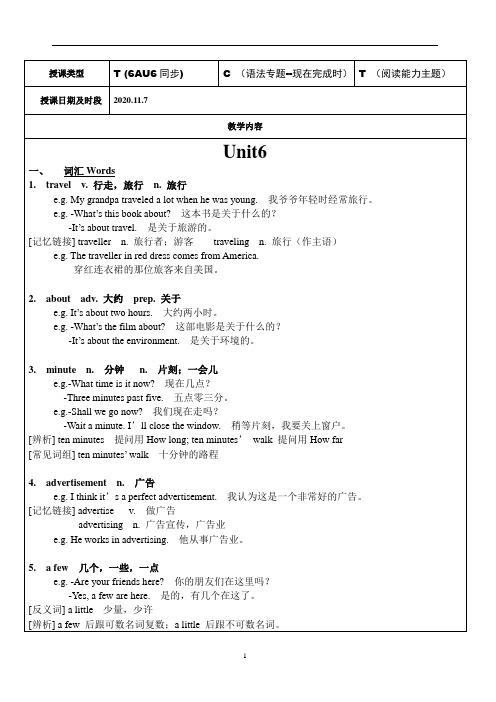
3.How often does your mother go to the s_________? school4.Shall I wait for you at the underground s_______ at three o’clock ? station5.There is a beautiful fountain in our h_______ e________. housing estate6.I visited a lot of t_______ when I was in Thailand(泰国). templesIII.Read, choose and complete1.I often see an old lady selling flowers ______(to/on) my way to school. on2.It takes John ______(only/almost)3 minutes to go to work on foot. only3._____ _____ (How far/How long) does it take your mother to cook food every day? How long4._____ _____ (How many/How much) time do you spend on your lessons, Susie? How much5.I saw some hawkers _______ (when/after) I was on the bus to school yesterday. when6.There’s a supermarket near my flat. I always go there ___ (on/by) foot. onIV.Read and choose( C ) 1. My cousin goes to school ______light rail every day.A) on B) on a C) by D) by a( D ) 2. When I am on the school bus, I can see many ______.A) temple B) kindergarten C) hotel D) people( A ) 3. Do you ______ the new post office when you walk to your factory ?A) see B) look at C) look D) to see( B ) 4. My father likes to read newspaper when he is ______ the undergrand.A) at B) on C) by D) in( D ) 5. We have bought a new flat. It’s _____ a famous church.A) far B) quite far C) far away D) near( C ) 6. John does his homework slowly. It takes him_____ two hours to finish it.A) only B) more C) almost D) much( A ) 7. I sometimes ______ to school but usually I _____ there by bike.A) walk…go B)go…walk C) walking…go D) go…walking( B ) 8. May spends one hour in _____ some cleaning every day.A) to do B) doing C) do D) did( D ) 9. Tina and Jack always _____ a bus to the cinema at weekends.A) go to B) use C) see D) take( B )10. Jane goes to school by ferry, _____ by minibus.A) and B) then C) but D) so--She _______ to the library. She will be back soon.A. has beenB. is goingC. has goneD. will go9.They _______ England and they will be back next week.A. have gone toB. have been toC. have gone inD. has been on10.—How well do you know the Opera House?—I know the place very well. I _______ Sydney many times.A. have been inB. have been toC. have gone toD. have arrived in四、学法提炼一、能力培养Ⅳ完型填空What do you know about the sea? Most of us have seen the sea. We know it looks very __70___when the sun is shining on itThe sea is very big, Look at a map of the word and you will find there is more sea than__71___ .The sea is very deep(深的) in some place . At a place near Japan ,the sea is eleven kilometers deep .Some parts of the sea are very shallow(浅的)The sea was very __72___many years ago. But now it is dirty because many people __73___ it. They put a lot of rubbish into the sea .We must save the sea. We must try our best to __74___ it clean1. A. interesting B. beautiful C. usual D. delicious2. A. sky B. air C. land D. trees3. A. dirty B. clean C. big D. small4. A. leave B. discuss C. promise D. pollute5. A. keep B. let C. help D. pickⅤ首字母My name is peter .my best friend in my class is John. He came to our class only three months ago. John is six month older than me. He is 154 centimeters t__1___. He is four centimeters taller than me .I weigh fifity-two kilograms.John is always f__2___. He is always helpful, too. He helps me w__3___ my maths. He is not good at English, so I often help him , we like to do our homework t__4___. John is never angry. He never tells a live, He lives near my housing estate(小区).He sometimes comes to my flat to play games with me at w__5___. We are really good friends, aren’t we?。
上海牛津版英语六年级第一学期6A期末复习知识点总结1

must not
必须、很重要或必要不准,不允许或禁止
Wemust study hard.
You mustn’t leave school alone.
提问
把情态动词单独提前
Must we wait foryou?Yes,youmust ; No,youneedn’t.(非mustn’t)
花钱花时间
.spen.tw.yua.o.thi.pen...spen.tw.yua.i.buyin.thi.pen.
I spend two yuan on this pen.=I spend two yuan in buying this pen.
表示提议的句型
Shall we
Shall是情态动词+接动词原形
a little
只能修饰不可数名词,a little milk.
some
a lot of plenty of
既可修饰可数名词又可修饰不可数名词。当及可数名词连用时,只能及可数名词的复数形式连用
k. Plent.o.eggs.
someeggs. a lot of milk. Plenty of eggs.
the one on the left/right , the one in the middle =the left/right/middle one.
地点、方位表述
near离**近
far(away)from离**(很)远
直接接地点
.liv.nea.school. H.live.fa.awa.fro.school.
六年级英语(上)知识点
频度副词
频度副词
always、sometimes、usually、never
上海牛津版英语六年级上册六上6AUnit10U10同步讲义教案
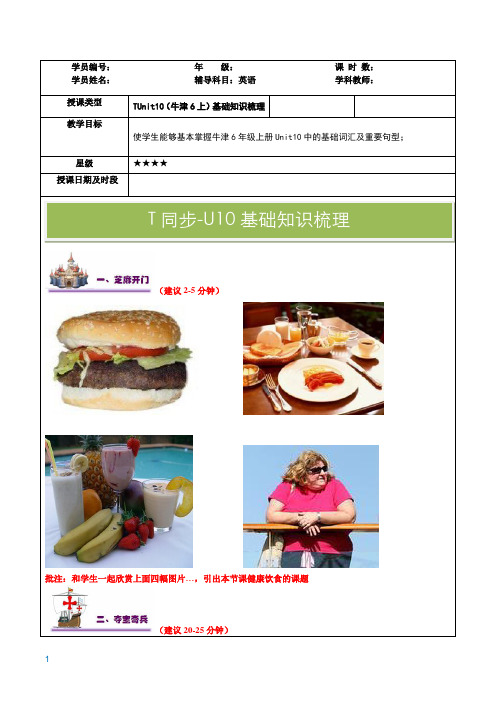
【常见词组】 fresh flowers 鲜花
fresh fish 鲜鱼,生鱼
fresh colours 鲜艳的色彩
feel fresh 觉得清新爽快
a fresh hand 新手
make a fresh start 重新开始
8. exercise n.锻炼;练习 e.g. Walking ,running and jumping are all healthy forms of exercise.
批注:让学生注意该词不同词性的区别
10.suggestion n.(1)建议 e. g. On you suggestion I bought the red hal.按照你的建议我买了红色的帽子.
(2)暗示;联想 e. g, Most advertisements work through suggestion.广告多通过启发人的联想力而发挥作用. suggest v.提议;建议;暗示 e. g. I suggest Paris as a good place for a holiday. 我提议去巴黎,那是个度假的好地方.
e.g. healthful food 有益于健康的食品
healthful exercise 有益于健康的锻炼
上海牛津版英语六年级上册六上6AUnit7U7同步讲义教案
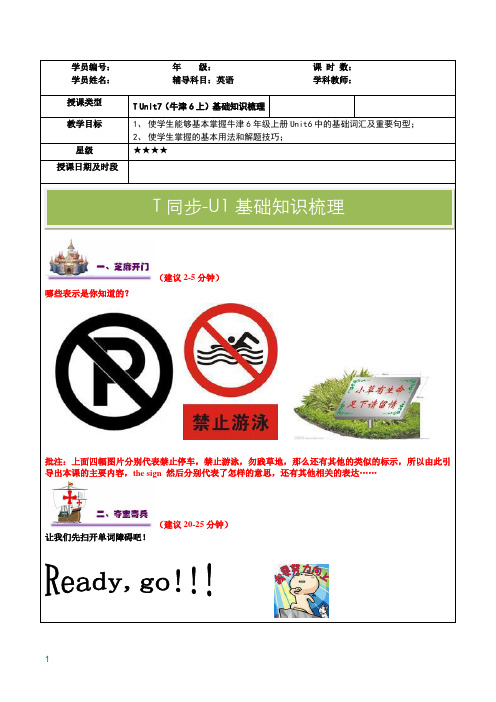
学员编号:年级:课时数:学员姓名:辅导科目:英语学科教师:授课类型T Unit7(牛津6上)基础知识梳理教学目标1、使学生能够基本掌握牛津6年级上册Unit6中的基础词汇及重要句型;2、使学生掌握的基本用法和解题技巧;星级★★★★授课日期及时段T同步-U1基础知识梳理(建议2-5分钟)哪些表示是你知道的?批注:上面四幅图片分别代表禁止停车,禁止游泳,勿践草地,那么还有其他的类似的标示,所以由此引导出本课的主要内容,the sign 然后分别代表了怎样的意思,还有其他相关的表达……(建议20-25分钟)让我们先扫开单词障碍吧!一、词汇Words1. rule n. (1)规则;习惯;统治,管理v.统治;支配,操纵e. g. We should always obey the rule . 我们应当时刻遵守纪律。
It’s difficult to rule a class. 管理班级是很难的。
【知识拓展】ruler n. 统治者;尺子批注:这里可引入词汇联想记忆法。
动词变名词时加后缀-er,进而进到出需拓展的内容rule- ruler。
2. enter v. 进入e. g. Let’s enter the supermarket to buy something . 让我们去超市买点东西。
【知识拓展】entrance n. 入口批注:先让学生回顾历史是哪个单词(enter),然后在原有单词上变形引出entrance。
3. loudly adv.大声地e. g. What happened? The people there are talking loudly.怎么了?那边人说话那么大声。
【反义】quietly ad. 安静地【知识拓展】loud a. 大声的批注:先让学生回忆相应的形容词,然后引导出形容词变成副词的方式,加后缀-ly ,进而引导出后缀-ly 的这样一个词缀。
4. mean v表示…….的意思;意味,包含;打算,意欲e.g. What do you mean by saying that? 你说那个是什么意思?【知识拓展】meaning n. 意思,意义;含义批注:让学生回忆动词时什么形式,然后名词时什么形式,进而引导出另外一种动词变名词的方式,加后缀-ing5. exit n出口;离开,退场v. 离去,退场e. g. I don’t want to exit .我不想离开。
6A上海牛津英语六年级第一学期重点
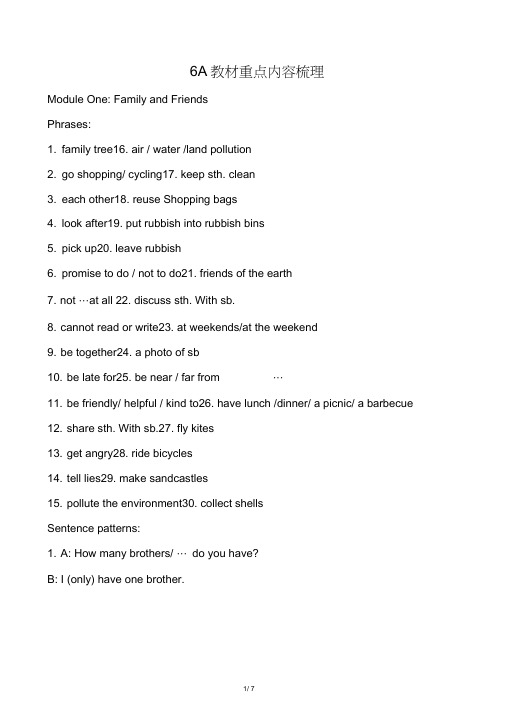
6A教材重点内容梳理Module One: Family and FriendsPhrases:1. family tree16. air / water /land pollution2. go shopping/ cycling17. keep sth. clean3. each other18. reuse Shopping bags4. look after19. put rubbish into rubbish bins5. pick up20. leave rubbish6. promise to do / not to do21. friends of the earth7. not …at all 22. discuss sth. With sb.8. cannot read or write23. at weekends/at the weekend9. be together24. a photo of sb10. be late for25. be near / far from …11. be friendly/ helpful / kind to26. have lunch /dinner/ a picnic/ a barbecue12. share sth. With sb.27. fly kites13. get angry28. ride bicycles14. tell lies29. make sandcastles15. pollute the environment30. collect shellsSentence patterns:1. A: How many brothers/ … do you have?B: I (only) have one brother.2. A: what do you do with yourB: I always/usually/ sometimes play games with ….A: What else do you do with sb.? B: I sometimes … with … 3. A: Have you been to…?B: I have just/already been to … / there. / I haven' t been to4. What about/How about + n./ving …?5. A: What do you usually do at weekends? B. I usually …6. A: Is … near or far away from …? B. It is near/ far away from ….7. A: Where have you been? 8. B: I have been to….9. Which place shall we visit? 10. When shall we go there? 11. What time?12. When are we going to come back? 13. How are we going to get there? 14. How much does it cost? Module Two: Places and Activities Phrases:…?… /ther1. a bank clerk2. a shop assistant3. put out fires4. cook food5. make our city a safe place6. look at7. listen to8. arrive at9. have tea10. at the entrance11. on the ground/ first floor12. on the open day13. at half past eight in the morning14. First,../Next, …/Then,…/After that,…/Fin ally, …15. take photos16. by ferry/ by underground/ on foot17. on the busSentence patterns:18. go to school19. a lot of/ some/ a few20.live near/far away from school21. an advertisement board22. light rail23. a department store24. a housing estate25. a police station26. half an hour27. wait for28. walk on the grass29. keep quiet30. run across the road31. pick the flowers32. turn left/right33. on the right/left34. in the middle35. go upstairs1. A: Would you like to be a/an …?B: Yes, I would.//No, I wouldn ' t.A: Why?/Why not?B: I would /wouldn ' t like to be a/an… because I2. A: What would you like to be?B: I would like to be …3. A: Do you live near or far away from B: I live near/far away from ….A: How do you go to school? B: I go to school by… /on foot.A: How long does it take? B: It takes …4. A: How long does it take you to get to…?B: It takes me about… to get there.5. A: What does Simon see when he is walking to school? B: Simon sees ...when he is walking to school.6. What does this sign mean?7. We must not eat or drink./Don' t eat ordrink.8. We must …9. A: Which escalator must we use? B: We must use the one in the middle. Module Three: Food and Drink phrases1. fried cabbage/chicken wings12. an unhealthy diet 2. steamed prawns with garlic13. do exercise 3. boiled eggs14. live in the countryside…?4. a shopping list15. stay with sb.5. at the vegetable stall16. plenty of / a lot of6. in the frozen food section17. a little/ some7. in the market/supermarket18. my favourite breakfast8. have a picnic19. too much spicy food9. a bottle of jam20. eating habits10. a packet of nuts21.the food pyramid11. a slice / slices ofSentence patterns:1. A: What would you like for dinner tonight?B: I ' d like …for dinner.A: What kind of …would you like?Would you like … or …?B: I ' d like …2. A: Have you bought any …?B: Yes, I ' ve bought some …A: Where did you buy it/them?B: In the market, at the …stall/i n the …secti on.A: How much was it/were they?B: It was /They were …yuan.3. A: Shall we buy some soft drinks?B: Ok./ That ' s a good idea.4. Let 's buy some bread and a bottle of jam.Let ' s go to the supermarket to buy some food and drink for the picnic.5A Would you like some …?B: No, thanks / yes, please6. A: Why do you like …?B: I like it/them because it 's/they ' re sweet/delicious/tasty/spicy.7. A: Why not?B: I don 't want … because it is too ….8. A: May I have some … , please?B. Ok/ Sure/ All right/ Yes, you may. Here you are.//NO, you may not./ I> Xyou can ' t..9. A: How much sugar do we need every day?B: We need a little sugar every day.10. A: Which one was healthier/less healthy?B: …' s diet was healthier than/less healthy than/as healthy as/as unhealthy as …' s diet.11. How much … do we need?12. What do you usually have for breakfast/ lunch /dinner?。
上海牛津版英语六年级上册六上6AUnit10U10同步讲义教案

e.g. healthful food 有益于健康的食品
healthful exercise 有益于健康的锻炼
但现在也可以用 healthy 代替 healthful, 例如:
healthy food 健康食品
healthy outdoor work 有益于健康的户外活动
批注:这里可 引导学生再多想几个这样的单词。healthy\ unhealthy
(建议 20-25 分钟) 1
一、词汇 Words
1. healthy adj. 健康的;有益于健康的
e. g. It is healthy to eat fruit. 吃水果对身体有好处
You look very healthy. 你看起来很健康
unhealthy adj. 不健康的,对健康有害的
走路、跑步和跳远都是健康的体育锻炼. We do morning exercises and eye exercises every day.
我们每天都做早操和眼保健操 【注意】exercise作“锻炼”解释时,是不可数名词;但作“做操”、“练习”解释时,是可数名词.
批注:让学生注意该词可数名词和不可数名词词义的区别
4. pyramid n. 金字塔 e. g. Pyramid is a great project for man. 金字塔对人类来说是一项巨大的工程.
5. salt n.盐 e.g. I think you should eat little salt. 我认为你应该少吃盐 v.(1)用盐腌(食物) e.g. She is salting beef.她正在腌牛肉.
6. a little +不可数名词,plenty of +可数名词的复数形式或不可数名词 e.g. I have got plenty of stamps. 我有许多邮票.
- 1、下载文档前请自行甄别文档内容的完整性,平台不提供额外的编辑、内容补充、找答案等附加服务。
- 2、"仅部分预览"的文档,不可在线预览部分如存在完整性等问题,可反馈申请退款(可完整预览的文档不适用该条件!)。
- 3、如文档侵犯您的权益,请联系客服反馈,我们会尽快为您处理(人工客服工作时间:9:00-18:30)。
学员编号:年级:六年级课时数: 3 学员姓名:YYY 辅导科目:英语学科教师: XX授课类型T 词汇总复习星级★★★教学目标1.让学生对六年级上所有的重点词汇全面而熟悉地掌握,并学会学以致用;2.教给学生解题的方法和技巧,培养孩子良好的解题习惯和解题方法;3.通过课堂导入部分吸引学生的注意力,使学生能够将所有注意力集中在课堂上。
(建议2-5分钟)T同步-六年级上重点词汇总复习1批注:通过上面一组图片导入本节课主题:职业。
老师引导学生说出图片里没有的职业,这样可以考察学生对于职业的了解,顺便了解学生本单元课程学习的程度。
(建议20-25分钟)一、词汇Words1. 1. island n.岛屿批注: “在岛屿上”用介词on,如:on Hainai Island2. at weekends在周末批注:at weekends=at the weekendon weekends=on the weekendWe always go to the park at the weekend.我们总是周末去公园。
3. On weekdays在工作日批注:My parents go to work on weekdays.我父母在工作日去上班。
4. be near…/far (away) from…离……近/远批注:My school is near my home. So I walk to school every day.我家离学校近,所以我走路去学校。
Kitty lives far (away) from her school. She goes to school by bus.基蒂住得离学校远,她坐公交车去上学。
5. photo n.照片(pl. photos)批注:a photo of...一张……的照片This is a photo of my family and me.这是一张我和我家人的照片。
Can I look at that photo of you and him?我能看着你和他的照片吗?6. plan v.计划批注: 1) plan sth.We are planning a meeting.我们正在计划一个会议。
2) plan to do sth.We are planning to have a meeting.我们正计划开个会。
2【联想】plan 计划Have you made your holiday plan?你制定好了假期计划了吗?7. visit v. 参观;拜访Alice wants to visit Shanghai next year.爱丽丝想明年来上海参观。
Tom visits his grandparents twice a week.汤姆一周去看爷爷奶奶两次。
批注:visit是及物动词,因此,在对参观的地点划线提问时应用what,对拜访的人物划线提问时应用who。
【联想】visit n.参观,拜访Alice wants to pay a visit to Shanghai next year.爱丽丝想明年来上海参观。
8. let sb. (not) do sth.让某人(不)做某事批注:Let us look after the earth. 让我们照料地球。
Let us not pollute the earth.让我们不要污染地球。
9. sth. cost sb. some money某物花费某人多少钱批注:The piano cost me 10,000 yuan.这架钢琴花了我一万元。
10. Grandma's sixtieth birthday奶奶的第六十个生日批注:表示“某人第几个生日”时,要用序数词。
11. something special=some special things 一些特别的东西12. make sth. for sb.=make sb. sth.为某人做某事批注:Mum made a cake for me.=Mum made me a cake.妈妈给我做了一个蛋糕。
13. buy sth. for sb.=buy sb. sth.为某人买某物批注:His parents bought a new shirt for him.=His parents bought him a new shirt.他的父母给他买了一件新衬衫。
二、重要语法Important Gramma1.情态动词:would/would not批注:would为情态动词时常意为“愿;想……”与like、love、hate、prefer、be glad/happy等词连用,表达比较合意愿的做法。
例如:I’d hate you to think I was criticizing you.我可不愿让你觉得我是在批评你。
3I' d be only too glad to help. 我非常愿意帮忙。
缩略式常写为“’d”,I’d=I would我想……否定式为would not,其缩略式为“wouldn’t”,例如:I wouldn’t like to go shopping today. 今天我不想去购物。
★would like something/would like to do something想要某物/想要做某事,例如:I would like a cup of tea=I would like to have a cup of tea. 我想要一杯茶。
I'd like to play basketball.我想要打篮球。
★would like somebody to do something想让某人做某事,例如:I’d like you to clean the window. 我想让你擦一下窗户。
2.Wh-question: Wh-问句:批注:(l)What would you like to be? 你想成为什么?这是由what引导的特殊疑问句用来询问某人希望自己将来从事什么职业,例如:--What would you like to be? 你想成为什么?--I'd like to be a doctor.我想当一名医生。
--What would your sister like to be? 你姐姐想成为什么?--She would like to be an English teacher.她想成为一名英语老师。
(2)Why/Why not? 为什么/为什么不?why解释为“为什么”,是个疑问词,询问原因,回答一般用because。
例如:①-Why do you like this book? 你为什么喜欢这本书?-Because it is very interesting.因为它非常有趣。
②-Why do you like to be a doctor? 你为什么想成为医生?-Because I want to make sick people better.因为我想让病人好一点。
Why not?表示“为什么不”,提出建议,后面接动词原形。
例如:①-Why not go to see a film? 为什么不去看电影?-That’s a good idea.好注意。
②-Why not take the underground? 为什么不乘地铁?-OK.好的。
3. connective: because连词:becauseHe likes his job because he wants to make sick people better.批注:“because”解释为“因为”,是从属连词,用来连接两个表示因果关系的句子。
例如:I d on’t like chocolates because they are too sweet.我不喜欢巧克力,因为太甜。
Mary is absent from the class today, because she is ill. 玛丽今天没有来上课,因为她生病了。
[友情提示]because不能和so同时出现在一个句子中。
例如:(错)Because it is raining outside, so we can't go shopping today.(正) Because it is raining outside, we can't go shopping today.因为正在下雨,我们今天不能去购物。
类似这种用法的还有although(虽然)和but(但是)。
(错) Although he is only five, but he knows a lot of English words.(正)Although he is only five, he knows a lot of English words.虽然他只有五岁,他认识许多英文单词。
4[固定搭配] because of sth 意为“因为……”,后面接名词或动名词,例如:His uncle can’t walk because of his illness,因为生病,他叔叔不能走路了。
[友情提示] because后面要接一个句子,而because of后面要接名词或动名词。
例如:We can't go to the park because it is snowing heavily.=We can't go to the park because of heavy snow.我们不能去公园,因为正在下大雪。
(建议5-10分钟)Ⅲ. Read and choose (选择填充) 25%1. May needs __________ uniform for school.A. aB. anC./2. My bag is new, __________ I don't like it.A. andB. orC. but3. --Do you like __________coats? -No. I like the blue one.A. bothB. allC. this4. Don't shout. It's __________ noisy.A. tooB. toC. two5. How __________ Alice go to school?A. isB. doesC. do6. There isn't __________ juice in the bottle.A. someB. anyC. many7. -- __________ is this bicycle? -It's Alice's.A. WhoB. Who'sC. Whose8. The __________ grow and grow. Then they become frogs.A. tadpolesB. cocoonsC. caterpillars9. It is sunny today. Let__________ go outside and play.A. isB. usC. we10. This is your robot. __________ is in the box.A. MeB. MyC. Mine11. He often helps __________ with __________ English.A. her.., herB. she ... herC. her.., she12. __________ a bird. And __________ name is Polly.A. Its ... itsB. It's... itsC. It's... it's13. It's time __________ play games.A. forB. onC. to14. They go to school __________ seven thirty.A. onB. aboutC. at15. __________ morning we read English.A. InB. EveryC. On563. Rose has got some flowers in her hands. (改为一般疑问句)__________ Rose got __________ flowers in her hands?4. Tom can ride his bicycle to school. (改为现在进行时)Tom __________ __________ his bicycle to school.5. The tigers eat 10 kilos of meat every day. (对划线部分提问)How __________ meat __________ the tigers eat every day?Keys:I!!. Read and choose 25分1.A2. C3. A4. A5. B6. B7. C8. A9. B 10. C11.A 12.B 13.C 14.C 15. B 16.B 17.B 18. A 19. C 20.A21. B 22.C 23.B 24. A 25.AIV. Choose and write 10分A. 1. D/E 2. B/A/CB. 1. B/D 2. E 3. A/CV. Read and rewrite 15%分1. don't/close (shut)2. is/an3. Has/any4. is/riding5. much / doscore:____________ (3大题,共50分)(建议2-5分钟)批注:批注:批注:要求学生把做错的习题反复巩固,不断加强练习,避免下次犯同样的错误。
